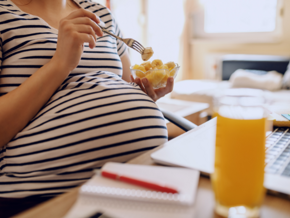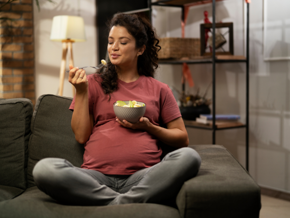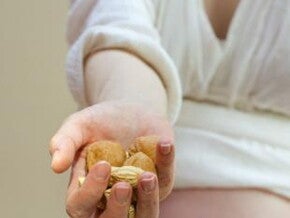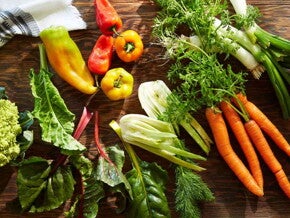
Unmasking Pregnancy Diet Myths
Unmasking Pregnancy Diet Myths
During pregnancy the most common advice you get from anybody is on what to eat and not eat. While much of this information is true, there are plenty of myths doing the rounds. The bottom line is: eat well and eat intelligently and you’ll have absolutely no reason to worry.
Unmasking pregnancy diet myths
Pregnant women crave pickles and ice-cream.
Maybe. Particular food cravings may occur, but are not universal. Cravings are very common in pregnancy, especially for foods that provide energy and calcium, such as milk and other dairy products.
Pregnant mothers must eat for two.
False. Pregnant women do need to eat a little extra – but not twice as much! The main thing is to eat a well-balanced diet from all the food groups, so you get all the right nutrients. It’s only in the second and third trimester where your energy needs will increase slightly.
Pregnant mothers shouldn’t consume fish and fish oil.
False. Fish is an important part of a healthy diet and contains high-quality protein and other essential nutrients, such as omega-3 fatty acids. Fish is also low in saturated fat. Some fish can contain higher levels of mercury that may harm an unborn baby or young child’s developing nervous system. The best approach is to eat fish lower in mercury, such as prawns, canned light tuna and salmon. Limit those that contain higher levels of mercury (e.g. shark, swordfish and mackerel).
Drinking coffee has a negative effect on pregnancy.
False. Coffee in small amounts does not affect your baby, but avoid drinking more than three cups a day (200-300mg or less per day). Very large amounts of caffeine may result in a baby with low birth weight.
Related articles

Healthy Food for Pregnancy
Discover the power of healthy food for pregnancy: essential nutrients, vital vitamins, and recommendations for you and your baby's well-being.
10 mins to read

Pregnancy Symptoms and Concerns
Pregnancy is exciting, exhilarating and totally different for every woman. This means pregnancy symptoms will also be different for every woman.
6 mins to read

Food Cravings During Pregnancy
Pregnant women will tell you they experience almost irrepressible cravings for certain foods – salty, sweet, spicy or fatty foods. Some think it’s the body signaling what the growing baby needs.
2 mins to read

Pregnancy Food: Nourish You and Your Baby
Planning nutritious, well-balanced foods to eat while pregnant is one of the best ways to support maternal and foetal health.
7 mins to read

Food Safety During Pregnancy
Often there is a lot of advice on what NOT to eat during pregnancy - because reducing the risk of bacterial infection which can make your baby ill, is super important.
1 min to read

Maternal nutrition can influence baby's lifelong health
Every mother wants to give her baby the best start in life.
1 min to read

A Guide on Foods to Avoid While Pregnant
What you eat (and drink!) during pregnancy can impact your developing baby. It’s important to be aware of foods to avoid while pregnant which can make you and your baby unwell.
7 mins to read

Eating For Three
In a multiple pregnancy, your body needs extra nutrition to provide the vitamins, minerals and energy your babies need. That doesn’t mean eating triple the amount.
2 mins to read

Essential Pregnancy Nutrients - Essential Fatty Acids
Eating a varied and balanced diet during pregnancy is very important for both you and your baby.
2 mins to read

Essential Pregnancy Nutrients - Iodine
Do I need to take an iodine supplement? Learn more about iodine when you're trying to fall pregnant and during pregnancy.
1 min to read

Essential Pregnancy Nutrients - Folic Acid
Eating a varied and balanced diet during pregnancy is very important for both you and your baby.
2 mins to read

Stay-Healthy Menu Planner
Use this practical menu planner to help you be your best
1 min to read

Babies’ Taste Preferences Start Before They Are Born
Did you know that Mum's diet in pregnancy can influence baby's future taste preferences?
1 min to read

Essential Pregnancy Nutrients - Iron
Eating a varied and balanced diet during pregnancy is very important for both you and your baby.
3 mins to read

What Foods Should I Eat When Pregnant?
While you’re pregnant, your body protects and nurtures your baby. You can provide essential nutrients your baby needs by eating the right foods throughout your pregnancy.
6 mins to read

Essential Pregnancy Nutrients - Protein
Eating a varied and balanced diet during pregnancy is very important for both you and your baby.
2 mins to read

Essential Pregnancy Nutrients - Vitamin D and Calcium
Eating a varied and balanced diet during pregnancy is very important for both you and your baby.
3 mins to read

A mum-to-be does not need to eat for two
Gaining the recommended amount of weight during pregnancy can help your baby’s development before birth and ensure a normal weight at birth.
1 min to read

Breastfeeding Essentials Checklist
Planning to breastfeed but not sure how to start preparing? Here is a list of our breastfeeding tips for first-time parents to help you prepare.
2 mins to read
Related tools
Pregnancy Week By Week
Use our pregnancy tool to track the week-by-week changes you and your baby go through to stay up to date with your delivery and your baby's development.